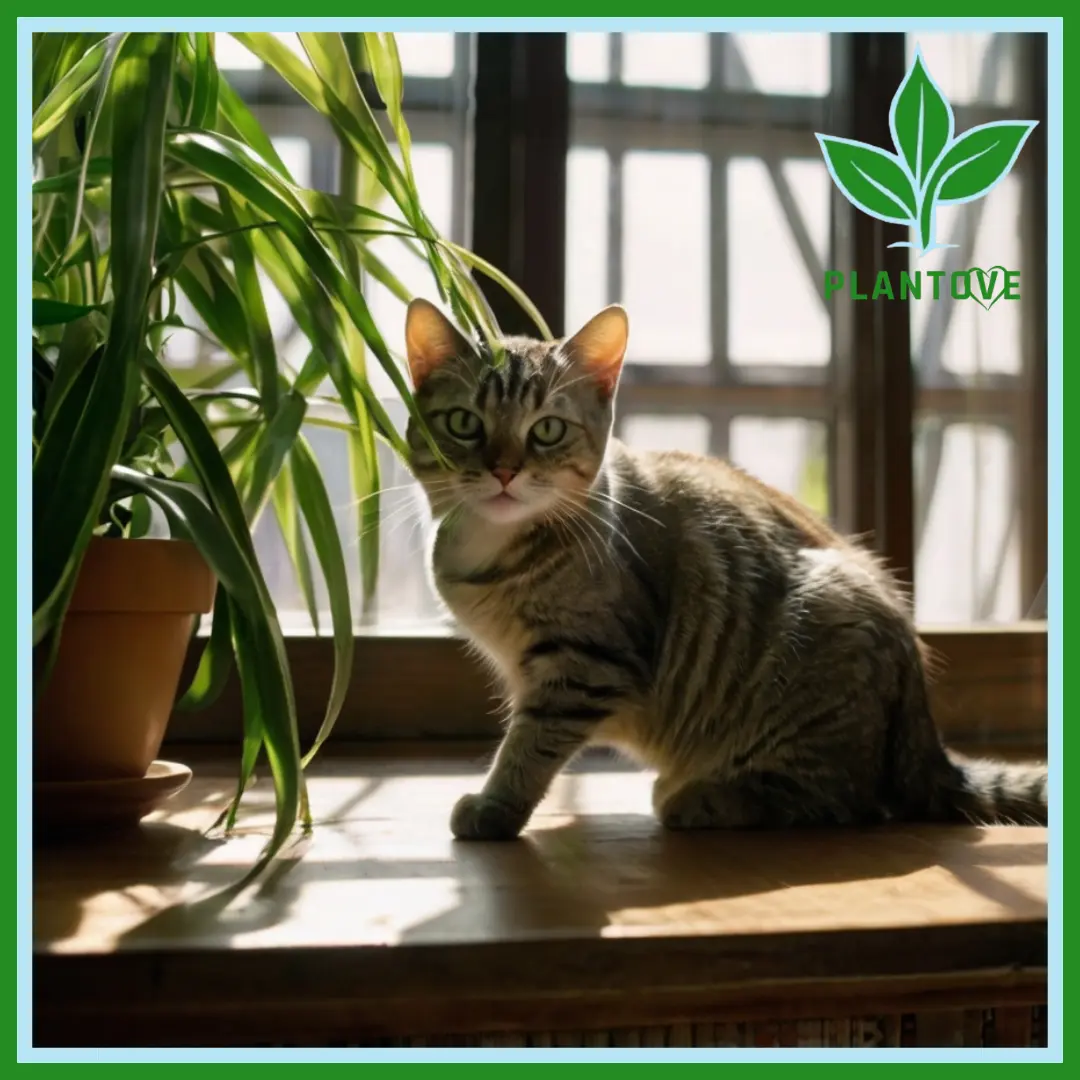Spider plants (Chlorophytum comosum) are popular houseplants known for their air-purifying qualities and striking appearance. With their long, arching leaves and easy care, they are often found in homes and offices. However, for pet owners, especially cat owners, there’s always the concern: Are spider plants toxic to cats? This guide will answer that question and provide helpful tips on keeping your feline friend safe.
What Are Spider Plants?
Before diving into the safety concerns, let’s briefly discuss what spider plants are. Spider plants are hardy, low-maintenance plants native to tropical and southern Africa. They are a popular choice for both beginner and experienced gardeners because they grow quickly, tolerate various conditions, and require minimal care. Spider plants are commonly used as indoor plants due to their adaptability to low light and their ability to thrive in hanging baskets.
The most common variety of spider plant features green leaves with a white or yellow stripe down the middle, and its name comes from the small “spiderettes” or plantlets that dangle from the mother plant, resembling spiders.
Are Spider Plants Toxic to Cats?
The short answer is no, spider plants are not toxic to cats. According to the American Society for the Prevention of Cruelty to Animals (ASPCA), spider plants are listed as non-toxic to cats and dogs. This means that if your curious cat happens to chew on a spider plant leaf, it is unlikely to cause serious harm.
Why Are Cats Attracted to Spider Plants?
Even though spider plants are non-toxic, they seem to attract cats more than other houseplants. But why? The answer may lie in the chemical composition of the plant. Spider plants contain compounds that are similar to opium, which can give cats a mild euphoric effect. Some pet owners report their cats behaving somewhat similarly to when they encounter catnip after nibbling on spider plant leaves.
This attraction, however, does not mean the plant is dangerous to your pet, but it does increase the likelihood that your cat might chew on it, and excessive ingestion of any plant material can still cause digestive issues in cats.
Potential Risks of Spider Plants for Cats
While spider plants aren’t toxic, there are still a few things cat owners should be aware of when keeping these plants in their home.
1. Gastrointestinal Upset
If your cat chews on a spider plant, the most common side effect is mild gastrointestinal upset. Like many plants, spider plants contain fiber, which can cause stomach discomfort if consumed in large quantities. This may lead to symptoms such as vomiting, diarrhea, or loss of appetite. In most cases, this is not serious and resolves on its own, but it’s still worth keeping an eye on your cat’s behavior if they start snacking on houseplants.
2. Choking Hazard
Long leaves like those of spider plants can pose a choking hazard to pets. If a cat bites off a large piece of the leaf, it may cause them to gag or choke. To prevent this, make sure to trim any long or drooping leaves that your cat could easily reach.
3. Exposure to Chemicals
One overlooked danger is the use of chemicals like pesticides, fertilizers, or insecticides on your plants. If you’ve treated your spider plant with any chemicals, ingestion by your cat can lead to serious poisoning, even though the plant itself is non-toxic. Always use pet-safe products or avoid applying harmful chemicals if you have pets in the home.
How to Protect Your Cat from Spider Plants
Given their allure to felines, keeping spider plants out of reach is one of the best ways to protect your cat from overindulging in these leafy greens.
1. Place Spider Plants in Inaccessible Areas
One of the simplest ways to keep your cat from chewing on your spider plant is to place it in an area that’s hard for them to reach. Hanging baskets are a popular solution, as they keep the plant elevated and away from curious paws. Alternatively, you can place the plant on a high shelf or windowsill where your cat doesn’t have easy access.
2. Offer Cat Grass as an Alternative
Cats love chewing on plants, and one way to curb this behavior is to provide a healthy alternative, such as cat grass. Cat grass is safe and can satisfy your cat’s urge to chew without risking an upset stomach. By providing an appealing alternative, you may be able to divert their attention away from your spider plant.
3. Use Deterrents
If your cat is especially persistent, you might want to consider using pet-safe deterrents. Products such as bitter apple spray or citrus-scented sprays can be applied to the leaves of the spider plant. Cats generally dislike the taste and smell of these deterrents, which will discourage them from chewing on the plant.
4. Supervise Your Cat
When introducing any new plant into your home, monitor your cat’s behavior to see if they show interest. Some cats might completely ignore the plant, while others may see it as a new toy or snack. If your cat seems too interested in the spider plant, take steps to remove it from their reach or use one of the preventative measures mentioned above.
FAQs on Spider Plants and Cats
1. Why does my cat keep eating spider plants?
Cats are naturally curious creatures, and the mild hallucinogenic effects of the compounds in spider plants can make them enticing. If your cat keeps eating your spider plant, try offering them safe alternatives like cat grass.
2. Can eating spider plants harm my cat?
In most cases, eating spider plants won’t harm your cat, but it could cause mild digestive issues like vomiting or diarrhea. Keep an eye on your cat if they nibble on the plant and consult your vet if symptoms persist.
3. Should I remove spider plants if I have cats?
While it’s not necessary to remove spider plants, you should take precautions to prevent excessive chewing. Keeping the plant out of reach or offering alternatives like cat grass can help.
4. Are there any other common houseplants that are toxic to cats?
Yes, many common houseplants are toxic to cats, including lilies, philodendrons, and pothos. Always research the toxicity of any plant before bringing it into a home with pets.
Non-Toxic Alternatives to Spider Plants
If you’re worried about your cat’s interaction with houseplants, there are many other non-toxic plants you can consider for your home. Some cat-friendly houseplants include:
- Boston Fern
- Areca Palm
- Bamboo Palm
- Calathea
- Maranta (Prayer Plant)
These plants can add greenery to your home without posing a risk to your furry companions.
Conclusion: Are Spider Plants Safe for Cats?
In conclusion, spider plants are not toxic to cats, making them a safe choice for pet owners. However, while they aren’t poisonous, they can cause mild digestive issues if your cat chews on them too much. By taking precautions such as keeping the plant out of reach, providing alternative plants like cat grass, and using deterrents, you can protect both your cat and your spider plant.
For pet owners who want a safe, attractive, and low-maintenance houseplant, spider plants are a great choice. Just be mindful of your cat’s behavior around the plant and take steps to prevent any issues. With the right care, both your spider plant and your feline friend can happily coexist.

